Gennady and Igor Kofman: A journey into history with the founders of Docudays UA
Gennady and Igor Kofman: A journey into history with the founders of Docudays UA
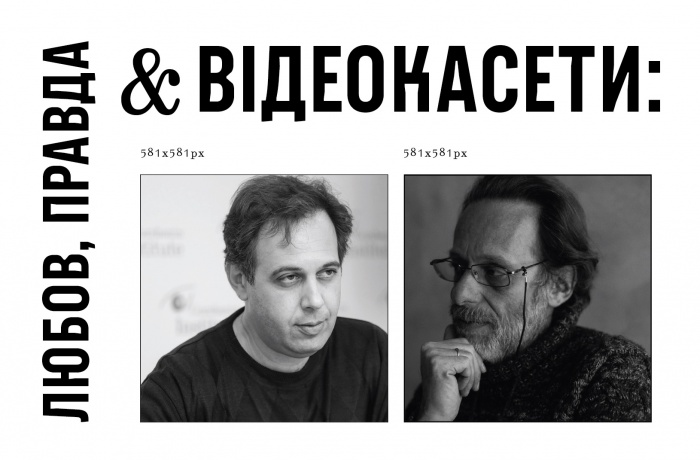
How was the Docudays UA International Human Rights Documentary Film Festival born? Where did its journey begin? What history has it been through in 20 years?
This conversation was recorded with true enthusiasts of documentary cinema who discovered this field for Ukraine and have been working to develop it for over two decades. Gennady Kofman is a director, producer of over 50 films and animations, one of the founders and the first head of the Docudays UA International Human Rights Documentary Film Festival and the Travelling Festival in Ukrainian regions. In 2019, Gennady passed down his responsibilities as the Programme Director and all of his executive roles. Now he remains a member of the Board of NGO Docudays and of the Selection Council.
Igor Kofman was a deputy head of the festival at the very beginning; later he became the regional coordinator for Kharkiv Region, and now he continues to work with Docudays UA as the project coordinator of the Department for Network Development. Igor is the person who helps implement the most technically daring ideas in film demonstration, and every film that is later featured on screens for our audiences goes through him.
Please tell us how the festival was born.
Gennady Kofman: I personally discovered the world of human rights documentaries at the One World festival in Prague. I think it was in 2002. And by 2003, I already managed to “infect” my friends with the idea of creating our own platform in Ukraine.
Igor Kofman: Those were the times of discovering the new world of documentaries.
G.K.: Yes, it was 2002–2003. Most cinemas were repurposed as billiard rooms, slot machine rooms, car dealerships. None of this had anything to do with cinema. While in Kyiv something was still happening — for example, Kinopanorama and Kyiv Cinemas were still open, there were thematic screenings — outside of Kyiv everything was being shut down. Back then I lived in Kharkiv, but I visited Kyiv every week on business trips. I tried to organise my trips to coincide with events at the House of Cinema. There were events there every week, retrospectives, premieres. But outside of Kyiv, there wasn’t even any pirated content online.
The idea of the festival was to bring the best documentaries to Ukraine and make them accessible to everyone in our country, and not just in the capital.
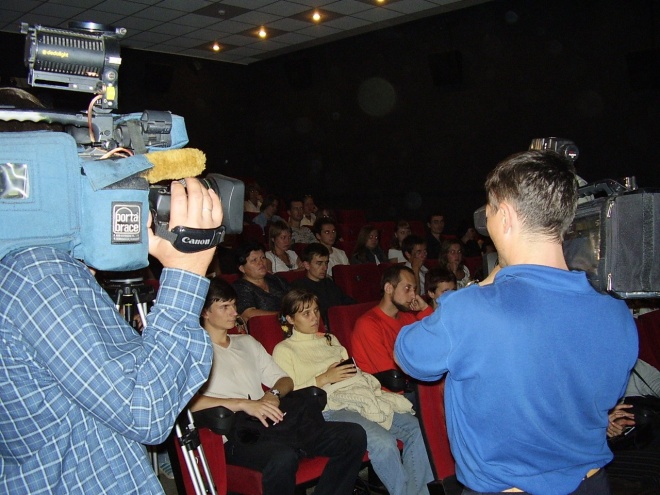
Photo from the festival archives, provided by Gennady Kofman
Already in early 2003, we formed a community of like-minded people. The first partner to join the preparations for our festival was UNHCR. And the International Renaissance Foundation was the only donor who financially supported us that year. It turned out that they’d been thinking about the idea of organising a human rights documentary film festival in Ukraine for a while, and I think they understood better than we did that our country needed such a festival. Back then, few people were aware what human rights were. Few people knew what documentaries were either.
Volodymyr Yavorskyi also joined the organisational committee, back then he was the head of the Council of Ukrainian Human Rights Organisations, one of the most influential human rights organisations in the country. He was soon elected as the executive director of the Ukrainian Helsinki Human Rights Union, and since then the UHHRU became a co-founder of the festival.
We immediately realised that the festival in Kyiv and in the country’s regions were inherent parts of each other. Moreover, we even dreamt of changing the city of the main event (the festival’s capital) every year. One year it was to be Kyiv, next year Kharkiv, then Donetsk and so on. It didn’t happen for purely logistical reasons. The only international airport in the country at the time was in Kyiv, and there were very few hotels in the regions; all of this would make a major festival incredibly expensive.
A travelling festival itself isn’t our invention, there were already similar formats in the world, such as “echoes” of some major festival when a selected programme of winning films were brought to other cities or even countries. Our colleagues, the human rights festivals Watch Docs in Warsaw and the One World festival in Prague also held travelling festivals in other cities in Poland and the Czech Republic. But nobody had the scale that we have now.
I.K.: When the festival was born, it was already travelling, because the opening of the first festival in 2003 took place in November in Kharkiv, and then screenings were held in Donetsk, Odesa, Lviv, and only at the end, in December, the programme visited Kyiv.
The second important component after accessibility to the whole country is the fact that documentaries should be watched and discussed. We don’t need audiences of 400–700 seats. It should be a small-scale room, but there has to be a conversation after the film. We were helped with this by human rights advocates, because meaningful discussions would not be possible without involving our partners.
Eventually we decided that the festival would visit the regions where there are people who want to host it. That is, local enthusiasts, NGOs that want to become our local partners.
Where does the name of the festival, the Travelling Docudays UA, come from?
I.K.: At first the festival was called the Days of Human Rights Documentary Cinema. I mean, initially we didn’t plan a huge programme or competitions. The first year, we had a bit more than 30 films, and from about 2009 the final name developed, the Docudays UA Human Rights Documentary Film Festival. For screenings in the regions, we added the adjective “Travelling.”
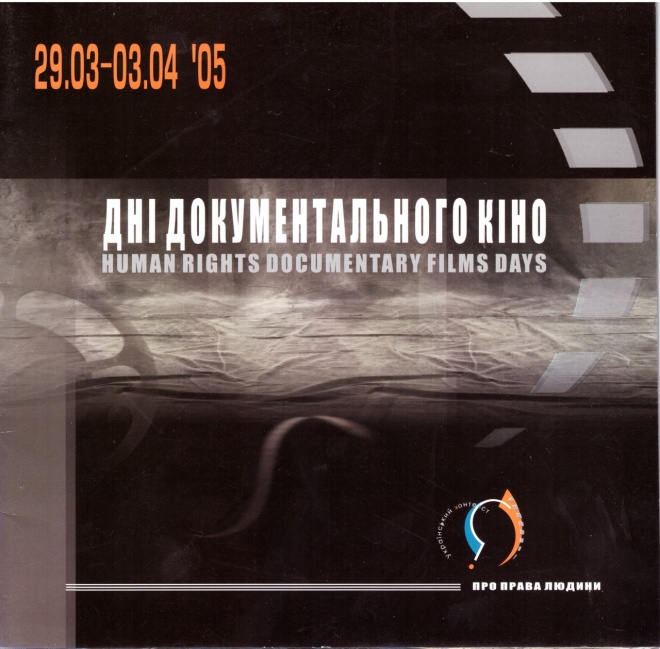
One of the first festival posters, provided by Gennady Kofman
G.K.: Why is the festival in the regions called Travelling? Because we actually did travel, we took large bags with VHS cassettes, a video projector, a video tape player. Igor was always responsible for a bunch of wires, extension cords, equipment without which there may have been no festival screenings at all. Occasionally we’d even bring our own screen. Eventually video cassettes were replaced with disks. It was a bit easier.
Every year, the number of regions that wanted to host the festival was growing. The time came when we were no longer physically capable of visiting every region, every screening. Eventually our regional partners began to organise screenings on their own.
There was a very funny situation in one of the regions once. Although it only seems funny now, years later. One of the organisers reported to us that the festival in their city went great. Everything went very well. But he decided to re-edit one of the films a bit, shorten it, and he was convinced that the film became much “better” after this operation…
We realised that we had to work with our partners very seriously. We started implementing the practice of training for our regional partners, mandatory meetings. We discussed the technical aspects of organising a good-quality screening, copyright and many other things. We also gave each partner freedom to choose their programme, so that everyone could select a programme based on the understanding of the audiences in each specific region.
Igor, please share how your personal story with the festival began.
I.K.: I’m Gennady’s assistant, so we worked together in the same dimension. Gennady has been in love with cinema since he was fifteen. Documentary cinema has become his life. For me it was a discovery of a new world, so I’m probably just like everyone else, Gennady infected me, too.
Before Docudays UA began, we’d already had experience in creating and holding festivals, so we felt confident. In Kharkiv, we organised European Film Days, demonstrated selections of films from different nations, for example, French, Polish, Dutch films. We organised retrospectives and premieres of films by specific filmmakers. But documentaries required more effort. After the Soviet heritage, they were perceived as boring and annoying propaganda.
I wonder, what were the very first films that you showed as part of the festival?
G.K.: In 20 years, the festival brought together 4–5 generations of filmmakers. At the first festival, there was a film made by one of the luminaries of Ukrainian documentary filmmaking, Oleksandr Koval. Back then we had no idea that Hamlet with a Happy End would be his last film. It was about theatre therapy for people with mental disorders. By now it’s a classic of Ukrainian documentary cinema. Now the festival programme includes new films created by his students. For example, one of his last students was Alisa Kovalenko, who created the film We Will Not Fade Away (the film won the Main Award of Docudays UA in 2023).
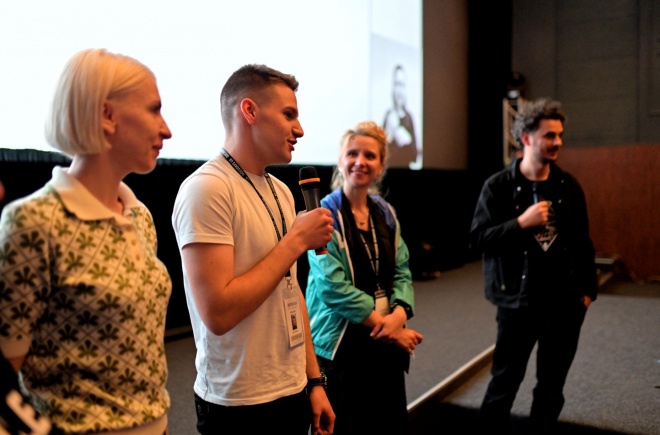
Alisa Kovalenko, the protagonist and the team of the film We Will Not Fade Away, 2023
I’d also like to mention Andriy Zahdanskyi and Serhiy Bykovskyi. They belong to the generation of “Perestroika filmmakers”.
I.K.: I think that the two films that were among the first ones to strike me were the Yerevan film Open Air and the Undelivered Letters by the Polish classic Marcel Łoziński. The former proved to me that documentaries can be as striking and sensitive as feature films, and the latter made me fall in love with shorts.
You’ve been working on the festival for almost 20 years. Please share the most interesting stories that have happened to you in this time.
G.K.: I immediately recall the first festival, when our partners helped us organise screenings in Donetsk. The venue was near the Regional Administration. Our partner went to arrange things, told them about the festival. And in response, he got the question: “What do you mean human rights festival? What rights and which human?” But there were also optimistic stories, Igor can share a story of how he made “gangsters” fall in love with documentaries.
I.K.: It happened at the Bommer Cinema, one of the oldest cinemas in Eastern Europe, a very popular art house cinema in Kharkiv. The screening had already begun when a group of viewers who were very atypical for festival audiences entered the hall; they were outraged that there was not a single fiction film in the programme that night. I offered them to come in and check what kind of films were presented. When they came out after the film, they all had red eyes from crying. They must have been discussing it for half an hour afterwards. Later we saw them at the next screenings. It was one of the victories for documentary cinema.
G.K.: By the way. We had this Polish film about children of the streets. During the Travelling Festival, an assistant to the governor from a local administration addressed us and offered us to show the film during a meeting of the region’s mayors. And, indeed, the governor began the meeting about children’s rights with a screening of the film, and then he said, “The film is about another city in another country. But if you say that this problem doesn’t exist in our region, you don’t belong in your office.”
Has the Travelling Festival affected your decisions in your main professional field of work, or maybe your personal life?
G.K.: It just so happened that for over fifteen years, Docudays UA, including the Travelling Festival, were the main part of my professional life. I must admit, I love observing the audience watching a film, observing how they breathe during a screening, watching if their reaction matches my expectations. These observations were my reward for everything that was done to let the film and the audience meet. And these observations really helped me in my work as a producer.
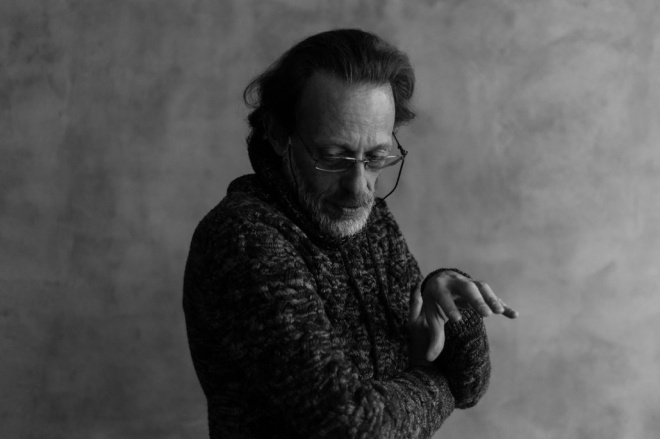
Gennady Kofman, photo provided by the interviewee
I.K.: For me personally, the Travelling festival is a major discovery which never ceases to amaze me. Over the years, I’ve watched thousands of films, and every time it’s something new. These films give me an opportunity to learn to listen, to see a person.
G.K.: As for personal life, I must mention the stories of my colleagues. We already have Docudays families that met during our festival, their love was born in front of our eyes. It’s so nice that they still have very stable and harmonious relationships.
What period of working on the festival was the most difficult for you and why?
G.K.: The first years were the hardest. We didn’t have enough resources, either human or financial. In 2008, the Kherson team joined the work on the festival. Over time, the process of preparing for the festival became more structured and thought-through. Years later, we feel incredibly grateful to all our colleagues.
Igor, what about you?
I.K.: I think that the most difficult decision that was made was to allow new people to dive into your own work, and let go and trust them yourself. It was also the most correct decision.
Please tell us how the festival was organised during the Maidan.
I.K.: The subject that year was There Is a Choice.
G.K.: But nobody knew how prophetic the festival topic would become.
I.K.: That year, I gave my own name to the Travelling Festival, “the sanitised festival.” The venue we were offered in Kharkiv operated as an art gallery. The management ordered us all to wear shoe covers to screenings. It was a good image of that year, an attempt by authorities and law enforcement to make our programme “sterile,” avoid difficult topics and films.
G.K.: Back when we were preparing for the Travelling Festival, weird things started happening. We received calls from our regional partners complaining that local authorities started checking and “cleansing” their programmes, demanding that they remove certain films, make the programme “sterile,” as Igor said, they interfered with the festival’s organisation. We felt this especially in the East and in Crimea. And when the festival began, local authorities created obstacles to our screenings: they’d cut off power, start urgent repairs in venues where screenings were scheduled, create provocations.
They were the most adamant to prevent screenings of the Open Access almanack. But interestingly, they also actively banned the youth film almanack called Beyond Euro, which was about Ukraine during the Euro 2012 Football Championship. We realised that the government at the time was scared of the word “Euro” in the almanack title. This screening was banned in Crimea, and they opposed it in Kharkiv.
I.K.: I got a call from the director of a cinema where we were supposed to show films and asked me to come right away. We didn’t meet at the cinema but outside. She told me, almost whispering, that “authorities” came and watched all the films in her office. They shrugged and left. We joked at the time that the Security Service was our most active audience that year and that we should have organised a dedicated event at their office, so they didn’t have to go looking for our films. In a way, the subject of the festival and its promo turned out to be prophetic.
G.K.: That year, the programme also included another provocative film called The Reluctant Revolutionary. It was a portrait of Yemen at the beginning of the revolution against Ali Abdullah Saleh’s dictatorship. But in Eastern regions, the law enforcement wanted to know “where exactly the revolutionary was and why he was hiding there.”
What was the festival like during the pandemic, and how did you realise that it was needed even under lockdown?
I.K.: In 2020, the lockdown began a day before the beginning of the festival, but at that time we realised that, first of all, we had fans who were prepared to be with us under any circumstances, and second, we had an incredible team capable of dealing with any challenges. We became the first film festival in Ukraine that opened in a new format.
How did 2022 change you personally and why, despite these difficult circumstances and uncertainty, did you continue to work on the festival?
I.K.: For me personally, 24 February was unexpected, and the first days that followed it were hard, chaotic, we had no connection. On 5 March, my family and I managed to leave Kharkiv for Lubny.
I was most surprised by our team’s attitude towards the events. We searched for each and every one of them and were genuinely happy when our colleagues made contact. I want to say that what will always stay with me is gratitude.
In Lubny, we organised an aid point for those who were forced to leave their homes. That year changed me. First, I started speaking Ukrainian. Second, I completely lost any sentimentality and softness, even though I never used to be a harsh person.
G.K.: In 2022, the Travelling Festival expanded the scope of its work. The team initiated screenings of the Travelling Festival’s programme for Ukrainian communities abroad, for our fellow citizens (mostly women), for those who were forced to leave their homes and found themselves far from home. For many, these screenings and meetings provided incredible psychological support.
In your opinion, how has the festival affected Ukrainian audiences in 20 years?
G.K.: If at the very beginning of the festival there was total distrust of documentary cinema and lack of understanding of what it even was, in 20 years we have formed an audience of supporters of auteur documentary cinema. I recall how the team once formulated our goal: to make human rights documentaries trendy among the youth. I think this has really happened.
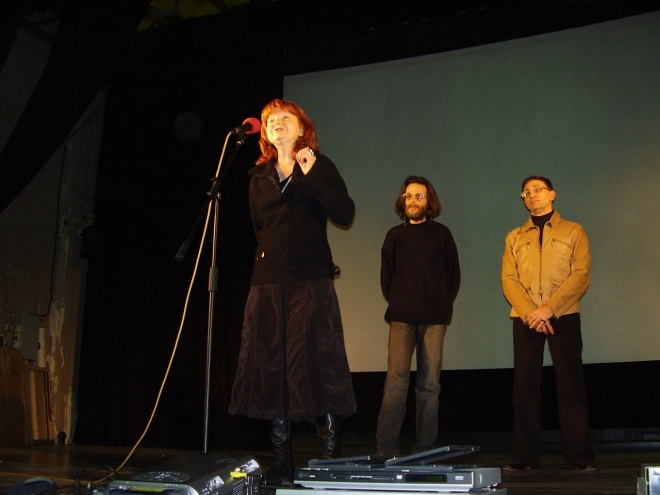
A photo from the festival archive, provided by Gennady Kofman
In addition, in 20 years, a unique generation of Ukrainian documentary filmmakers has formed. Today, the most active generation that holds up the country are 30 to 40 year olds. When we were just starting the festival, many of them were 10 years old, maybe the oldest ones were 20. Most of them grew up together with Docudays UA. And now they are the most prominent documentary filmmakers who receive awards at the world’s leading festivals.
I.K.: Imagine a picture. Ivan Franko street, there (in the Ministry of Culture building) was once the office of the State Film Agency, and back then it was a department of the Ministry of Culture. Massive oak door at the entrance, a green fence nearby, and a funeral wreath on it. For me, it was the image of both culture and Ukrainian cinema. In the first years of the festival, we weren’t even able to collect a programme of Ukrainian documentaries. There were no films to include.
G.K.: Once our goal was to integrate Ukrainian documentary filmmaking in the global film process. Back then it seemed almost unattainable. And now we see that Ukrainian films are featured at every global film forum, Ukrainian documentary filmmakers participate in many co-production projects.
What makes the Travelling Festival unique?
I.K.: For me, the Travelling Festival is a very powerful network for alternative distribution of documentaries. In addition to the artistic element, auteur documentaries also have powerful social content. Films require reflection, conversation, and such events as we do have this potential. And for filmmakers it’s also an opportunity to engage audiences in conversation, and sometimes even in action, that is, it’s an influential instrument both for presenting films and for “impact distribution.”
G.K.: As of 2015, Ukraine had 400 halls and a bit over 160 cinemas. And the Travelling Festival took place in 254 Ukrainian localities that year, films were demonstrated at 604 locations. We should also take into account the quality of screenings, contact with audiences, discussions. That is, a more powerful distribution system was formed than traditional theatre distribution, so the festival’s uniqueness is fantastic.
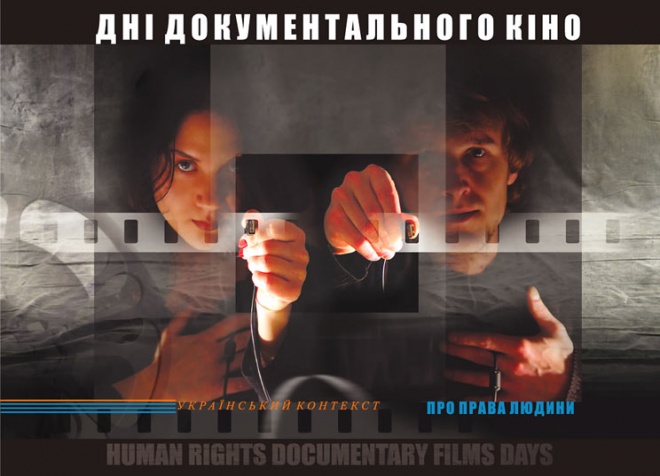
One of the first festival posters, provided by Gennady Kofman
We mentioned the events of the Maidan. In this context, an important fact is that in almost every region, the leaders of the Revolution of Dignity were connected to our festival. We worked with the most influential NGOs. Today, we have colleagues at the frontline defending our country. The festival has long been shaping “characters of the future” and civil society.
I.K.: If about 1,000 people watch films in every region in a year, and we have 50 regional partners, we can calculate it — it’s an incredible number over 20 years.
We must speak loudly about our achievements. I think that we can’t measure the Travelling Festival’s influence just in numbers. In 20 years, the Festival has formed a culture of watching films, formed a community of supporters of auteur documentaries. Our alternative distribution network, in my opinion, is stronger than the cinema network. The number of screens which the Travelling Festival now has for auteur documentaries is incredible.
How do you see the “image of the future” for the Travelling Festival?
G.K.: As for the future, I think that the Travelling Festival as it is today has already completed its mission. The next stage, in my opinion, is the local branches of Docudays UA which should become a sort of hubs in every region of the country. Today it’s already an institution with year-round work.
I.K.: We have many ideas and thoughts about this, in particular, we want to hold a strategic planning session together with other coordinators.
The conversation has been recorded by Ksenia Opria.
The 20th Travelling Docudays UA is held with the support of the Embassy of Sweden in Ukraine, Embassy of Switzerland in Ukraine, US Embassy in Ukraine. The opinions, conclusions or recommendations do not necessarily reflect the views of the governments, charities, or companies of these countries. Responsibility for the contents of the material lies solely on its authors.












